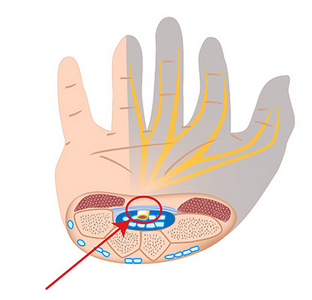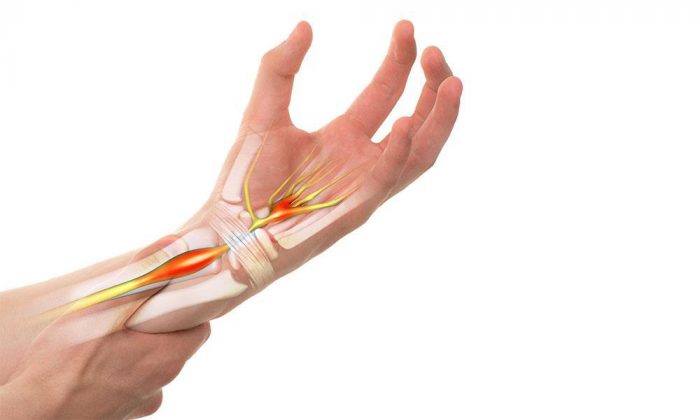The image below shows the Carpal Tunnel, a narrow area at the base of the hand that covers the nerve that provides for sensation in the thumb, index, and middle fingers. Carpal Tunnel Syndrome occurs when this tunnel become irritated, inflamed or injured, causing it to squeeze or compress the nerve as it passes through the tunnel. Carpal Tunnel Syndrome causes symptoms like pain, numbness, and tingling in the fingers and hand, and over time, it can also affect grip strength and fine motor skills.

It is well established that our sedentary and screen-time heavy lifestyles contribute to obesity, heart disease, high blood pressure, high cholesterol, stroke, depression, and a host of other conditions. Carpal Tunnel Syndrome (CTS) most commonly occurs when there are repetitive movements that rely on the fingers, hands, and wrists: precisely the sort associated with office and computer work. Up to 6% of the adult American population may suffer from CTS, having their quality of life reduced with symptoms such as sustained pain, numbness, and tingling in the hands. Women tend to be more likely to suffer from CTS than men. Fortunately, a Neurologist or Pain Management specialist can help to diagnose and treat these symptoms.
CTS can be diagnosed with the assistance of nerve conduction studies (NCS) and electromyography. Treatment can then include an appropriate prescription for medication, lifestyle changes, as well as local steroid injections. Steroids are medicines used to help reduce inflammation so pressure on the median nerve is relieved, reducing pain, tingling, and numbness. Injections are performed in the office and take less than a half hour. Another treatment is Neurotoxin injection for Carpal Tunnel Syndrome. The Neurotoxin medication works by blocking specific nerve signals in the injection area, minimizing signals that result in pain and muscle spasms.

The pain management specialists at Cayman Neurology and Pain Management use a holistic approach where all potential modalities to alleviate pain are incorporated into a treatment plan throughout a patient’s life. Any changes to patients’ symptoms will be addressed on an ongoing basis. Integrating lifestyle changes with a range of treatment options allows the patient to minimize degeneration and lay the ground for improvement.
For additional information on the treatment options for Carpal Tunnel Syndrome, contact Cayman Neurology and Pain Management. If you would like to schedule an appointment or check for availability, please book online or call+1 345-943-6900.
Copyright © 2024 Cayman Neurologist. All Rights Reserved.